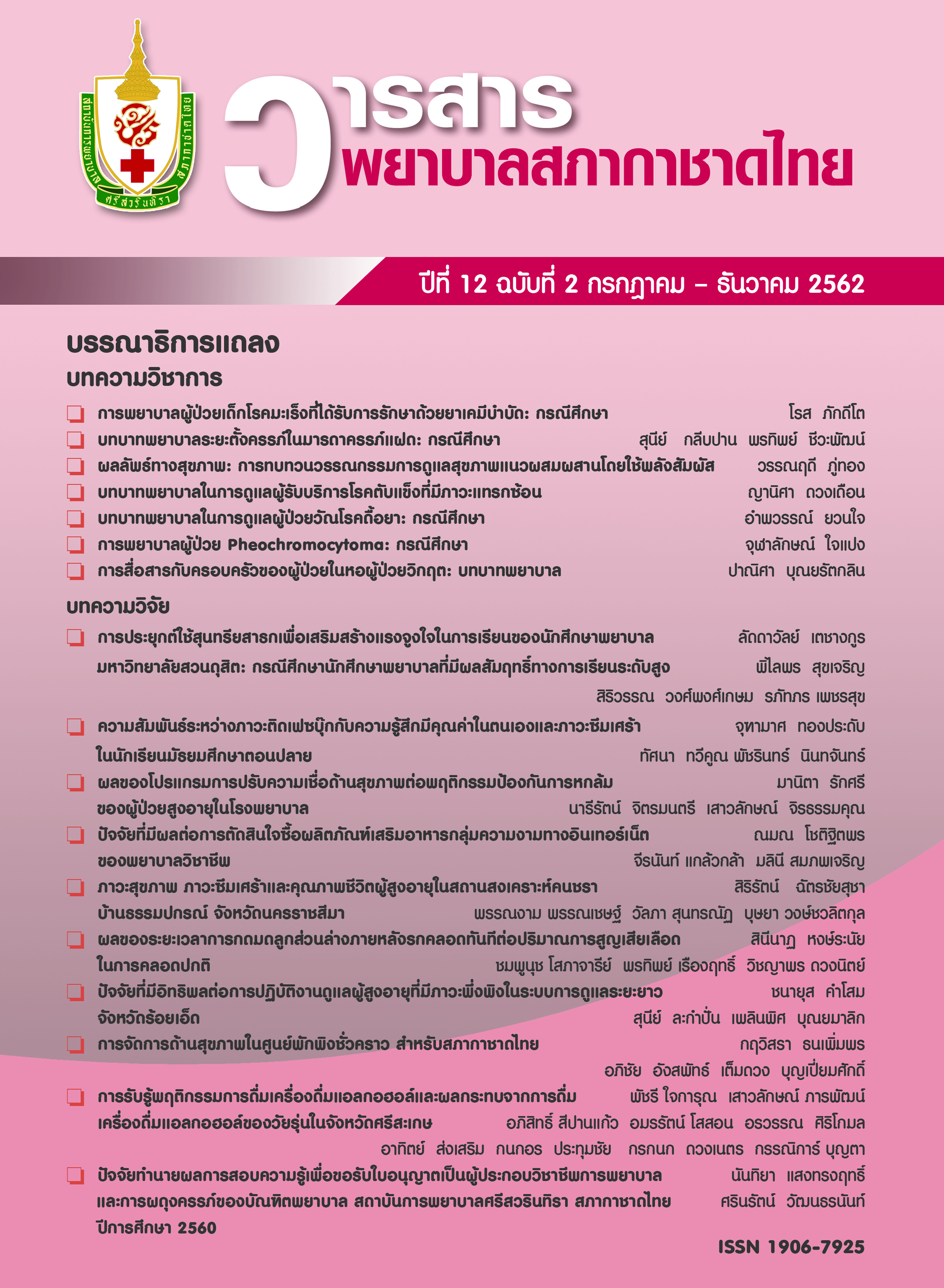Health Status, Depression, and Quality of life among the Older Person in Ban -Thammapakorn, Nakhon Ratchasima Province
Keywords:
health status, quality of life, older personsAbstract
This descriptive cross-sectional study aimed to assess the health status, depression and quality of life among older persons in Ban-Thammapakorn, Nakhornratchasima. The sample of this study consisted of 149 senior citizens. The data were collected using a structured questionnaire including demographic data, Health Status Questionnaire, Thai Geriatric Depression Scale and Quality of Life by the Shot Form (SF 36 V.02). Data were analyzed using descriptive statistics, Mann-Whitney U test and Kruskal Wallis test.
The results revealed that the elderly had common diseases and illnesses included hypertension 42.95%, cataract 17.44%, arthritis15.43%, diabetes14.09%, dementia 11.40%, peptic ulcer 6.71%, glaucoma 6.04%, heart disease 5.0%, Parkinson 4.69. Depression among the elderly was at the moderate level at 49.37% and severe level at 50%. There was significant difference between the depression score of the older adults at the two settings. (p<0.05) The average scores of quality of life were satisfaction in physical health by perceiving health status at 52.46% and mental health at 52.93%. On the other hand, the lowest score of satisfaction was in role — emotional and vitality.
The suggestions from this study are the study of psychological problems especially depression in the elderly for developing the quality of life among the elderly in elderly care homes.
References
2. Foundation of Thai Gerontology Research and Development institute. The situation of the Thai elderly 2007. Bangkok: TQP; 2008. (in Thai)
3. Foundation of Thai Gerontology Research and Development institute. Situation of the Thai elderly 2014. Bangkok: Amarin Printing and Publishing; 2015. (in Thai)
4. Tongdee J, Rongmuang D, Nakchatree C. Health status and quality of life among the elderly in the southern border provinces of Thailand. Nursing Journal of the Ministry of Public Health 2013;22(3):88-99. (in Thai)
5. Department of Local Administration, Standard Welfare of the Elderly, Ministry of Interior, Ministry of Social Development and Human Security, Announcement of Ministry of Social Development and Human Security “Government Housing”, Royal Thai Government Gazette No. 128, Part 28d, Page 29-3, dated 10 March B.E. 2554 (2011) 29-3. (in Thai)
6. Sudsuk U, Charupoonphol P, Fongsatitkul P, Kevalinsalit C, Jantarach S, Siengsanor C, et al. The situation of activity of daily living and quality of life development for the elderly. Bangkok: National Research Council of Thailand; 2009. (in Thai)
7. Daniel WW, editor. Biostatistics: a foundation for analysis in the health sciences. 7th ed. New York: John Wiley & Sons; 1999.
8. Jiandon C, Suwannapong N, Boonsuya C, Howteerakul N. Quality of life in rural elderly. Thai Journal of Public Health. 2011;41(3): 229-39. (in Thai)
9. Train the Brain Forum (Thailand). Train Geriatric Depression Scale. Siriraj Hospital Gazette 1994;46(1):1-9.
10. Ware JE, Snow KK, Kosinski M, Gandek B. SF-36 Health survey manual and interpretation guide. Boston: The Health Institute New England Medical Center; 1993.
11. The Elderly Health Group. Bureau of Health Promotion. Department of Health. Ministry of Public Health. Thai Elderly Health Survey 2013. Bangkok: Wacharin P.P. Printing; 2013. (in Thai)
12. Jitapunkul S, Suriyawongpaisal P, Kunanuson C, Pooncharoen W. Thai elderly health problems. Bangkok: Holistic-Publishing; 1999.
13. Prukkanon B, Sirisamutr T, Duangtipsirikul S, Puangladda S, Sudsriwilai K. The magnitude and gap in mental health service in a comprehensive intervention program (mhGAP intervention program) in priority areas under the universal health coverage scheme. Nonthaburi; 2013.
14. Sun Y, Zhang D, Yang Y, Wu M, Xie H, Zhang J, et al. Social support moderates the effects of self-esteem and depression on quality of life among Chinese rural elderly in nursing Homes. Arch Psychiatr Nurs 2017;31(2):197-204.
15. Suwanakitch P, Luangla P, Romyen S, Tubjig J, Mathapat W. Elderly quality of life in municipality. Buddhachinaraj Medical Journal 2013;30(2):171-80. (in Thai)
16. Teerakiatkamjorn A. Quality of life of elders in Suthep Sub-district, Mueang District, Chiang Mai Province. A. JMI 2011;3(1):150-68. (in Thai)
17. Global Conference on Ageing in 2008, Revenue Increase & Saving Promotion and Thai Retirement Pension System in 2008. Bangkok: J.S. Publishing; 2008. (in Thai)
18. College of Population Studies, Chulalongkorn University and Foundation of Thai Gerontology Research and Development institute. Situation of the Thai elderly 2014. Bangkok: Phongphanaich Chareonphol; 2015. (in Thai)
19. Kerdmeemul M. Quality of life of the aged: a comparison between urban and rural. Rajabhat Ramphai Barni Research Journal 2015;9(2):79-90. (in Thai)
Downloads
Published
Issue
Section
License
เนื้อหาบทความหรือข้อคิดเห็นต่างๆ ในวารสารพยาบาลสภากาชาดไทยนี้ เป็นความคิดเห็นของผู้เขียนบทความ ไม่ใช่ความเห็นของกองบรรณาธิการ หรือสถาบันการพยาบาลศรีสวรินทิรา สภากาชาดไทย






